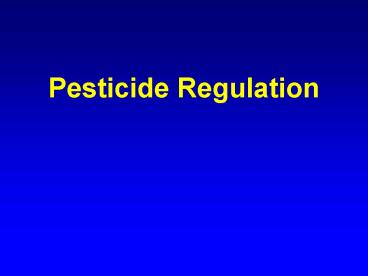Pesticide Regulation - PowerPoint PPT Presentation
1 / 41
Title:
Pesticide Regulation
Description:
Pesticide Regulation. Pesticide Regulation. What is a pesticide? ... Federal Insecticide, Fungicide, Rodenticide Act FIFRA. Food Quality Protection Act FQPA ... – PowerPoint PPT presentation
Number of Views:892
Avg rating:3.0/5.0
Title: Pesticide Regulation
1
Pesticide Regulation
2
Pesticide Regulation
- What is a pesticide?
3
Pesticide Regulation
- Pesticide Laws
- Pesticide Registration
4
Pesticide Laws
- Federal Insecticide, Fungicide, Rodenticide Act
FIFRA - Food Quality Protection Act FQPA
5
Pesticide Law
- FIFRA
- General Use Pesticides
- Anyone may use
6
Pesticide Law
- FIFRA
- General Use Pesticides
- Anyone may use
- Restricted Use Pesticides
- Certified Licensed Applicators
7
Pesticide LawFIFRA
- EPA determines how pesticides are
- Registered Sold
- Disposed of Stored
- Handled Transported
- Applied
8
Pesticide LawFQPA
- Determines how tolerances are set
9
Pesticide Registration
- Tests
- Toxicology
- Single dose
10
Pesticide Registration
- Tests
- Toxicology
- Lifetime exposure
- Reproduction
- Mutations
- Cancer
11
Pesticide Registration
- Tests
- Environmental fate
- Breakdown in soil, water
12
Pesticide Registration
- Tests
- Environmental fate
- Movement
- Runoff
- Leaching
- Drift
13
Pesticide Registration
- Tests
- Ecological effects
- Birds
- Fish
- Non-target plants
14
Pesticide Registration
- Tests
- Residue Analysis
15
Pesticide Registration
- Residue Analysis
- Pesticide applied according to proposed label
rates procedures. - Then pesticide residues on crops are measured.
16
- How much residue is safe?
17
Pesticide Tolerances
- The amount of pesticide residue that will be
legally allowed on food.
18
300 ppm No Effect Level
19
300 ppm No Effect Level
30 ppm
20
300 ppm No Effect Level
30 ppm
3 ppm
21
300 ppm No Effect Level
30 ppm
3 ppm
0.3 ppm
22
0.3 ppm spread over 5 crops Tolerance
Average 0.06 ppm each
23
Pesticide Registration
- Residue Testing
- Tolerance Setting
If residue lt tolerance, Pesticide registered
24
Safety Nets
- Never eat all crops in one day!
- Every day!
- For 70 years!
25
Safety Nets
- Never eat all crops in one day!
- Every day!
- For 70 years!
- Max rate not used!
- To all fields!
- To all parts of field!
26
(No Transcript)
27
- Your local government is going to hold hearings
on pesticide use. - How would you explain pesticide registration
safety to them?
28
FQPA -- The Food Quality Protection Act of 1996
29
Reasonable certainty that no harm will
result from aggregate pesticide exposure
30
EPA has compared setting tolerances to filling a
Risk Cup
31
Exposure that you could receive every day. For 70
years. With no significant risk of long term,
health effects.
32
EPA must lump compounds with a common mechanism
of toxicity
33
Common Mode of Action
Guthion
malathion
Lorsban
39 OPs
34
0.3 ppm OP spread over 5 crops Tolerance
Average 0.06 ppm OP each
35
EPA must consider aggregate exposure
Pets
Home
Water
Garden
Food
36
Aggregate Exposure Chlorpyrifos (Dursban,
Lorsban)
37
Dietary/ Non-Dietary Exposure Common
Mechanism of Toxicity
38
If the risk cup gets full, manufacturers could
reduce risk
39
By eliminating uses
Especially minor uses!
40
FQPA HITS
- Methyl parathion
- Azinphos methyl
- Chlorphyrifos
- Bendiocarb
- Ethyl parathion
41
Summary
- Procedure for setting tolerances
- Common mode of action
- Aggregate exposure
- Manufacturers need to reduce risk































